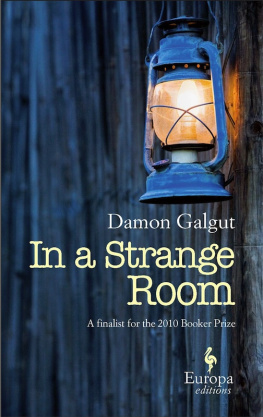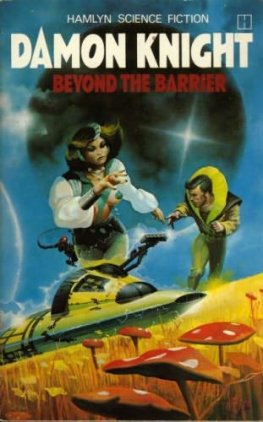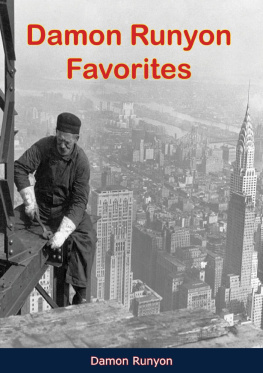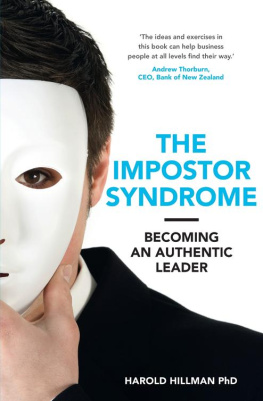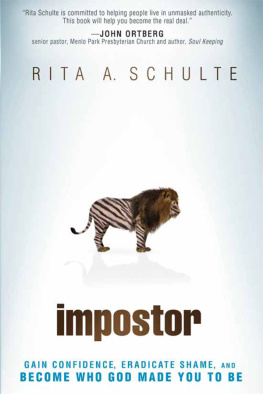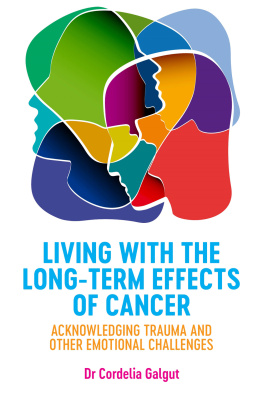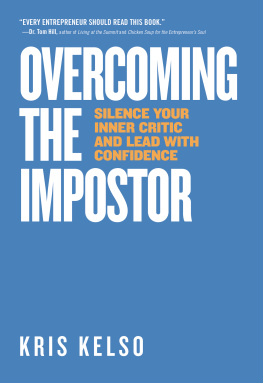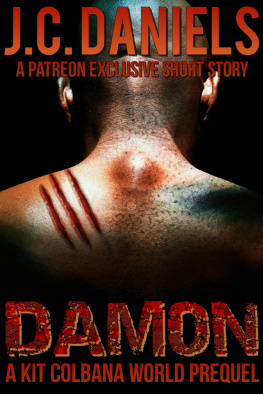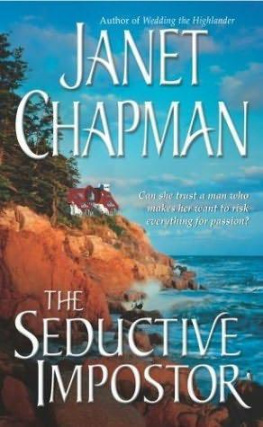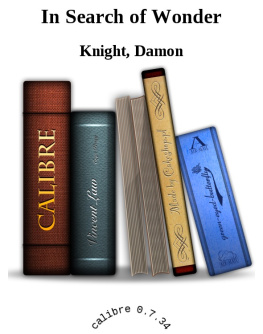Damon Galgut - The Impostor
Here you can read online Damon Galgut - The Impostor full text of the book (entire story) in english for free. Download pdf and epub, get meaning, cover and reviews about this ebook. year: 2008, publisher: McClelland & Stewart, genre: Detective and thriller. Description of the work, (preface) as well as reviews are available. Best literature library LitArk.com created for fans of good reading and offers a wide selection of genres:
Romance novel
Science fiction
Adventure
Detective
Science
History
Home and family
Prose
Art
Politics
Computer
Non-fiction
Religion
Business
Children
Humor
Choose a favorite category and find really read worthwhile books. Enjoy immersion in the world of imagination, feel the emotions of the characters or learn something new for yourself, make an fascinating discovery.

- Book:The Impostor
- Author:
- Publisher:McClelland & Stewart
- Genre:
- Year:2008
- Rating:4 / 5
- Favourites:Add to favourites
- Your mark:
- 80
- 1
- 2
- 3
- 4
- 5
The Impostor: summary, description and annotation
We offer to read an annotation, description, summary or preface (depends on what the author of the book "The Impostor" wrote himself). If you haven't found the necessary information about the book — write in the comments, we will try to find it.
The Impostor — read online for free the complete book (whole text) full work
Below is the text of the book, divided by pages. System saving the place of the last page read, allows you to conveniently read the book "The Impostor" online for free, without having to search again every time where you left off. Put a bookmark, and you can go to the page where you finished reading at any time.
Font size:
Interval:
Bookmark:
To Alison Lowry
YOUR HINTERLAND IS THERE
Inscription on a statue of Cecil John Rhodes
The Companys Garden, Cape Town
AUTHORS NOTE
Terms like Coloured or Bushman are fraught with the tensions of South Africas history. Used for a long time as slurs or for purposes of racial classification, in recent years they have to some extent been reclaimed and neutralised. Its in this spirit in which they appear here, with no intention to hurt.
BEFORE
The journey was almost over; they were nearly at their destination. There was a turn-off and nothing else in sight except a tree, a field of sheep and lines of heat rippling from the tar. Adam was supposed to stop, but he didnt stop, or not completely. Nothing was coming, it was safe, what he did posed no danger to anybody.
When the cop stepped out from behind the tree, it was as if hed materialized out of nowhere. He was clean and vertical and peremptory in his uniform, like an exclamation mark. He stood in the road with his hand held up and Adam pulled over. They looked at each other through the open window.
Adam said, Oh, come on, you cant be serious.
The cop was a young man, wearing dark glasses. He gave the impression, in all this dust and sun, of being impossibly cool and composed. There is a stop sign, he told Adam. You didnt stop. The fine is one thousand rand.
Wow. Thats a lot of money.
He smiled and shrugged. Your drivers licence, please.
Cant you let it go? Just give me a warning or something? He searched for the mans eyes, but all he got was dark glass.
I have to follow the rules, sir. Do you want me to break the rules?
Uh, well, it would be nice if you stretched them a bit.
The man smiled again. I could get into trouble for that, sir. After a pause he added, You would have to make it worth my while.
Sorry?
If you want me to break the rules, you have to make it worthwhile.
It was spoken so casually, in such a conversational way, that Adam thought hed misheard. But no: it had been said, exactly as he thought. He was stunned. Hed heard about this sort of thing, but hed never had to deal with it himself. He sat rigidly behind the wheel, trying to think it through, his sense of time frozen in the vertical white light, while the man stalked around the car, looking at the headlamps, the tyres, the registration. When he got back to the window, the cop said, And I notice your licence is out of date. That would be another thousand. So, what do you think? Lets saytwo hundred, and we can forget the whole thing.
Adam was suddenly outraged. No, he said.
No?
Absolutely not. Im not paying you one cent.
The man shrugged again. The smile was still there, flickering faintly around his plump little mouth. Your drivers licence, please, he said.

Adam managed to read the registration number of the cops car, which was parked behind the tree, as he pulled out, and he recited it to himself as he drove on. But he didnt have a pen and paper to hand, and by the time he reached the next service station, a few kilometres further, he wasnt sure any more whether the sequence of numbers was correct. Nevertheless, he wrote it down on a scrap of paper he got from the waitress in the tea-room adjoining the garage. He was repeating it, trying to match it to the memory in his head, when Gavin and Charmaine came in. They had pulled over when he was stopped and had watched the whole scene in the rear-view mirror. What was all that about? Gavin said.
He wanted money. He just asked for it, straight out like that.
Gavin snorted. How much did you give him?
I didnt give him anything. Adam glanced anxiously at his brother. What would you have done?
Well Gavin said, moustache twitching. Its a lot cheaper than the fine.
Thats not the point.
Okay, okay, whatever. Gavin looked around. Ive got another problem. Im wondering if were actually on the right road. I was pretty sure till the last turn-off. But all the road signs are mentioning some other place with a name I never heard of.
Ja, same place, said the waitress, who happened to be passing. Just the names changed. Its because of the new mayor. He changed it a year ago. A lot of people are upset about it.
I bet they are, Gavin said. Theyre doing it everywhere. Big waste of money. Now theyve got to reprint all the maps.
Adam only half-heard this conversation. His mind was still preoccupied with the cop. No threat had been made, yet the man felt somehow threatening. He stood like a dark gate-keeper at the door to Adams new life, blocking the path, one hungry hand extended.
As it happened, the town was only a kilometre or two further on. The road had been wandering aimlessly over the plain towards a distant line of mountains, as if trying to find a way across. But not far beyond the service station it went over a rise and on the other side was the town. It was built in a low valley, so that the landscape concealed it. There was a brief glimpse of a scattering of buildings, none more than a storey high, except for the church steeple, which rose like a strict, admonishing finger. On the far side of a river in the middle of the valley was the township, connected to the main town by a single concrete bridge. Across the top of a nearby hill the old name of the town had been spelled out in white stones, but somebody had started to rearrange them into the form of the new name and abandoned the job halfway through.
They turned off the road they were following and into the main street. The first and only stop was outside the church, where they pulled over. Some of Adams unease, which had lingered from the encounter with the traffic cop, seemed to find a focus there. The street, with its single supermarket and bank and butchery and post-office, its beauty salon and hotel and bottle store, clenched at his heart. Although it was the end of August, there were Christmas lights hanging tiredly on the streetlamps, still left over from last year. The road, which they had been following for so long, narrowed at its end on a vista of yellow scrub, in which a drunk man fell over, got up and staggered a few steps, then fell over again.
Gavin got out and came over. Cheery, hey?
Well, Adam said. It is Sunday.
Gavin blew through his moustache and shook his head. Lets go take a look at the house, he said.
The house was a shock. It was out at the edge of the white town, where the roads were untarred and the ground sloped steeply upward to the rocky crest of a ridge. It was very bare and basic, with a slanted tin roof. The windows had a blind, blank look to them. The paint was faded and peeling. The fence was overgrown with creeper, and the creeper had twined through the gate.
Gavin ripped at the creeper, clearing it. He was muttering to himself in a low, vehement voice, but he went silent as they stepped through onto an old slate path. The path ran through an orchard up to the front door, and the trees had grown out of control, their branches twisting and spreading. The slate was covered with a thick layer of rotting fruit, which gave off a haze of fermentation and flies. They picked their way, slipping and sliding, through fumes and a heady stink. Gavin took out a big iron key, which looked as if it should open a medieval monastery. But it slotted easily into the lock and twisted.
Adam let Gavin and Charmaine go ahead, as if they belonged here and he was the visitor. But as he stepped over the threshold he could feel the house pulling at him, drawing him inclaiming him. It was almost a physical sensation.
The air inside was dead and heavy, as if it had been breathed already. The furniture was a depressing mixture of old, clunky pieces interspersed with the tastelessly modern. The four rooms were functional and barren. There was no carpeting on the concrete floor, no picture on the walls, no softness anywhere. All of it was immured in a thick, brown pelt of dust. There was the distinct sense that time had been shut outside and was only now flowing in again behind them, through the open front door.
Font size:
Interval:
Bookmark:
Similar books «The Impostor»
Look at similar books to The Impostor. We have selected literature similar in name and meaning in the hope of providing readers with more options to find new, interesting, not yet read works.
Discussion, reviews of the book The Impostor and just readers' own opinions. Leave your comments, write what you think about the work, its meaning or the main characters. Specify what exactly you liked and what you didn't like, and why you think so.

